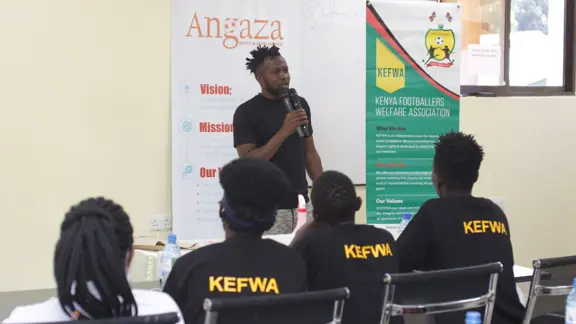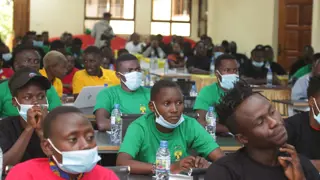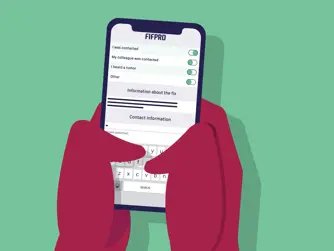Player Story
Festo Omukoto: "We made a plan to get three match-fixers arrested"

Festo Omukoto
Festo Omukoto currently serves as the ambassador against match-fixing for the Kenya Footballers Welfare Association (KEFWA). The midfielder recently played an important role in the arrest of three people attempting to fix matches in Kenya.

For several weeks I had been approached by a group of men who said they wanted me to fix a match for them. They wanted me to introduce them to players of Nairobi City Stars, so that they could then – with the help of the players – fix the match. As KEFWA ambassador, there was no way that I would do that. However, I told them that I would help them. Of course, I did not want to help them, but I wanted them to trust me.
I approached KEFWA president James Situma and told him that there were three men who were trying to get me to fix a match for them, or to help them fix a match. Together with James, I decided on a plan that would see them arrested. We approached Nairobi City Stars officials and we told them. They were happy to work with us. We worked on the plan and when the police felt they had enough evidence, they arrested the three people for trying to fix matches. That was in March.
They approached me in the first place because they knew that I had got into problems over match-fixing. I am a victim of match-fixing. When I was playing for Kakamega Homeboyz, a few of us were approached by some people to fix a match. They wanted us to play for a certain score. We were not interested and did not do what the match-fixers had asked us to do. But as we were playing two matches a week, we did not tell the club. We just didn’t think about it and we were also scared as we didn't know what would happen to us if we reported it.

But the match-fixers went to our club and told the officials that some of their players had agreed to match-fixing. The officials approached FIFA and after a while, we were told that we had been banned for four years. We were not given an opportunity to put forward our case and when we heard about the punishment, it was after the appeal date. So, there was nothing we could do.
After being banned, I was not even allowed to train with a team. I was sitting around at home most of the time. That is when KEFWA approached me and invited me to go and speak to players about the dangers of match-fixing. I became a KEFWA ambassador. I attend a lot of meetings, where I speak with the players and also coaches.
I advise them how they should react when they are approached to fix a match. I encourage them not to become involved in match-fixing. I can tell them from my own experience how badly it can affect their careers. I was still young when I was banned and should be playing football. I tell them that they should concentrate on their careers. I tell them to just be themselves. I remind them why they have become footballers and that they should strive to be players who can make things better. They can make things better by being good players and winning on the field of play.
I think that if I had spoken to KEFWA about match-fixing or had heard an ambassador speak about it when I was approached, I would have reacted very differently. I don’t think I would have gotten into the same trouble. I would have known that I needed to report the matter.

In that sense, I think the Red Button app that gives players the opportunity to anonymously report match-fixing is a very important and helpful tool. I believe if the Red Button had existed when I was approached, my case would have taken a different turn.
As a KEFWA ambassador and also being affected directly by match-fixing, I would encourage all players to make use of the Red Button app and for all unions to educate players on the use of this reporting tool. We are doing the same here in Kenya for the players.
Match-fixing is quite a problem in Kenya. It has had a negative effect on the sport in the country. We don’t want this in football in Kenya, it has seen the sport go backwards.
One of the reasons why there is a problem with match-fixing, is that the pay the players receive for playing – even in the first division – is very low. Players are tempted to make more money. And one of the ways they can make more money is through match-fixing. But it comes at a great cost. Sometimes to them individually, but certainly to football in Kenya. At the moment, football in the country is not really moving forward. In fact, it is going backwards. And match-fixing is one of the reasons for that.
The Red Button app explained

